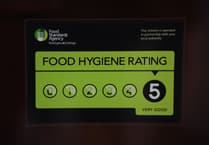The number of weekly number of coronavirus cases confirmed across Devon and Cornwall has dropped by 25 per cent and down to the lowest levels since the start of October.
A total of 650 new cases were confirmed across the two counties in the last week – the lowest since the week ending October 2 – with the total since the start of the pandemic at 45,589.
Cornwall has the lowest infection rates of any upper tier authority in England, with Devon second and Plymouth third, and at a lower tier level, the four lowest infection rates are all in Devon.
Government statistics show that 650 new cases have been confirmed across the region in the past seven days in both pillar 1 data from tests carried out by the NHS and pillar 2 data from commercial partners, compared to 835 new cases confirmed last week.
Of the 650 new cases confirmed since February 19, 174 were in Cornwall, with 65 in East Devon, 70 in Exeter, 47 in Mid Devon, 22 in North Devon, 104 in Plymouth, 12 in South Hams, 37 in Teignbridge, 103 in Torbay, 10 in Torridge and 6 in West Devon.
For specimens from between February 15 and 21, West Devon is the area in England with the lowest infection rate (7.2/100,000), with Torridge second (8.8/100,000), South Hams third (17.2/100,000), North Devon fourth (17.5/100,000), Cornwall seventh (35.7/100,000) and Plymouth eighth (36.2/100,000) in the bottom ten. East Devon (39.6/100,000), Teignbridge (43.2/100,000), Exeter (56.3/100,000), Mid Devon (69.2/100,000) and Torbay (83.7/100,000) are the other rates, with only Mid Devon having risen in the previous week.
In terms of infection rates per age range, case rates are highest in the 20-39 age ranges across Devon and Cornwall, with only North Devon, Mid Devon and West Devon (40-59s) and Torridge (80+) having infection rates higher in different age groups – although the Torridge figure relates to one positive case of someone aged 80-84, and the West Devon figure is one person aged 45-49 and one aged 55-59.
In terms of the latest MSOA cluster maps, that cover the period of specimen dates between February 15 and February 21, there are 128 areas of Devon and Cornwall with between 0-2 cases, up from 108 as of last Friday
The MSOA areas in each region with the highest number of cases are Perranporth & Goonhavern (10), Exmouth Town (10), St James’s Park & Hoopern (17), Tiverton East (15), Woolacombe, Georgeham & Croyde (4), Ernesettle (9), Yealmpton, Modbury & Aveton Gifford (4), Ogwell, Mile End & Teigngrace and Kingsteignton (both 9), and Blatchcombe & Blagdon (22). No area of Torridge or West Devon reported more than two cases.
It comes as Steve Brown, director of public health Devon, said that while it was good to see this week the publication of the government’s roadmap, which does set out dates for restrictions to be eased, it’s really important to remember that these dates are ‘no earlier than’ dates.
He added: ““Each step-down will obviously have to look at the science and the data and information, and those dates may well be pushed back if the science tells us the best thing to do is to delay those step-downs.
“At this stage, the most important thing to do is to continue to follow the national lockdown restrictions.
Since the vaccine programme has started to roll out, and now that the Prime Minister is describing a route out of restrictions, people’s attitude towards coronavirus is understandably changing – we’re looking forward to a time without restrictions when we can get on with our pre-COVID lives and professions.
“The rules that we in Devon have done so well to follow since last year, and which have kept our case numbers to one of lowest in the country and have undoubtedly saved lives, are I fear becoming less of a priority in some people’s minds.
“We must not let the vaccine, and the hope it brings, persuade us that these other measures are no longer necessary. They are.
“The vaccine is part of our way out of coronavirus. But not on its own or in isolation of the other prevention measures.”
The latest figures for the vaccine rollout show that in Devon and Cornwall, one in four adults have now had their first Covid-19 vaccine.
By Daniel Clark, local democracy reporter




